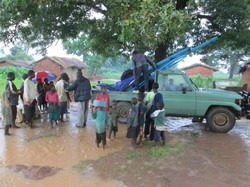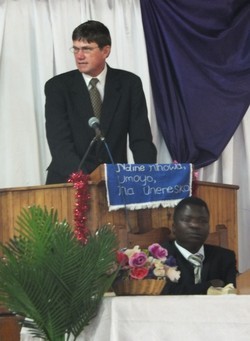Mud on the khonde (veranda), mud on the floors, mud on the sofa, and mud on the doors — sounds like the beginning of a children’s book but it is, thankfully, what we are experiencing the past few days.
The rainy season usually begins in earnest in December but there has been so little rain around and in Mzuzu that people’s crops are suffering and the water reservoir is low. Of course we do not know if the rains that we are having will continue and if they do, if they are timely enough or will be enough to avoid a disaster, but we are thankful for the blessing of rain and the mess that we have at this time.
While we are indeed grateful for the rains that water the crops and replenish the ground water that Jim’s projects are busy trying to extract for people, it does make getting to and from worksites and school more interesting. Driving to the water drilling sites is often described as “dancing” as you swerve to the left and then swerve to the right to proceed down the road.
Jim is especially thankful at this time of year for the four-wheel drive Land Cruiser pickup truck donated by PC(USA) congregations for the Synod’s [of Livingstonia] water and sanitation work that allows him even during the rains to get up and down from the Livingstonia Plateau with its infamous switchback rock and dirt road.

Malawi borehole —Jodi McGill
At the turn of 2014 Jim preached at Katawa Congregation, our church in Mzuzu, for the New Year’s Day service. Being blessed by God and how that is manifested in our lives was his theme.
“Prosperity Gospel” belief is very popular in our congregation. It links being blessed by God with giving money and receiving in return more money, political power, health, or other material gains.
Sometimes it seems that people reduce blessings or being blessed to a formula: giving + good works = blessings. So if life is good, projects meet their targets, there is adequate rainfall, and disasters do not happen, people are blessed and if there is a severe food shortage, family tragedies, or work difficulties, then they are not?
To paraphrase the conclusion to Jim’s sermon: God’s blessing is in His love for us, with which he showers us repeatedly by showing us grace, whether or not the world wants to reward our actions.
As we think on the possible ramifications of low rainfall and poor harvest, we wonder if the late rains are just a blip in the weather pattern or are there other causes? Is it directly related to the cutting of the trees, the charcoal burned for cooking fires that is made from that wood, air pollution, global warming?
It could be possible to fall into a state of worry, anxiety and even hopelessness except for the blessing of God’s love, which is described to us in verses like John 14:27, “Peace I leave with you; my peace I give you. I do not give to you as the world gives. Do not let your hearts be troubled and do not be afraid.” As well as Colossians 3:15, “Let the peace of Christ rule in your hearts, since as members of one body you were called to peace. And be thankful.”
These verses are continual reminders of God’s presence when we face family, church, community, and even world problems. They do not however mean we are to be inactive.
We can pray for people affected by environmental changes and disasters, illnesses, and wars.
We can support programs and people through the PC(USA) that care for those affected or are involved in averting environmental, social, and/or health-related issues.
For example, in peace and reconciliation work in South Sudan and Syria, in disaster relief through Presbyterian Disaster Assistance, in environmental issues through the Environmental Ministries office. We thank you for your support of us as we work with the Synod of Livingstonia in addressing health and health-related problems in Malawi.
On May 20 Malawi is having its first tripartite election — presidential, parliamentary, and local — so we ask for your prayers that there will be no violence and the elections will be deemed free and fair.
Since the end of February I have been in Decatur, Ga., so I can meet the Georgia Board of Nurses requirements to renew my Family Nurse Practitioner license. I have been able to maintain my general nursing license while working in Malawi but the past several years I have been working as a nursing clinical instructor for entry-level nurses, so my Advanced Practice RN (APRN) license was not renewed.
To renew the APRN license I have to practice 160 hours over the course of six weeks under the supervision of a licensed nurse practitioner. It has been difficult to arrange to do that in Malawi, and when in the U.S.A. with the family and church obligations it has been hard to squeeze the time to do it as well.
Therefore I will be volunteering at several clinics for the homeless that a group called the Community Advanced Practice Nurses operates. I cannot imagine being away from the family for so long, and living alone…a few hours of quiet in the house is bliss, but six weeks!
And to travel without having to continually count heads and passports will be akin to a phantom sensation after loss of an appendage, albeit not so permanent or traumatic. Please pray for Jim, the family, and me during this time.
Thank you again for walking alongside us in our work and with our family.

